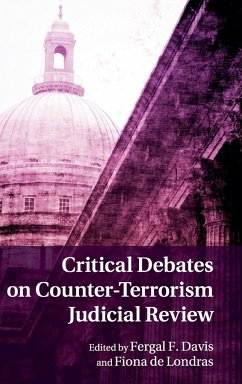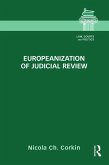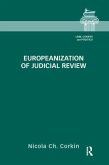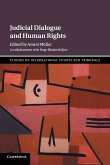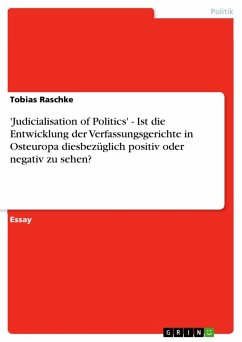Critical Debates on Counter-Terrorism Judicial Review
Herausgeber: Davis, Fergal F.; De Londras, Fiona
Critical Debates on Counter-Terrorism Judicial Review
Herausgeber: Davis, Fergal F.; De Londras, Fiona
- Gebundenes Buch
- Merkliste
- Auf die Merkliste
- Bewerten Bewerten
- Teilen
- Produkt teilen
- Produkterinnerung
- Produkterinnerung
An examination of the debates regarding whether judicial review is an effective and appropriate way to regulate counter-terrorism measures.
Andere Kunden interessierten sich auch für
![Europeanization of Judicial Review Europeanization of Judicial Review]() Nicola Ch. CorkinEuropeanization of Judicial Review210,99 €
Nicola Ch. CorkinEuropeanization of Judicial Review210,99 €![Europeanization of Judicial Review Europeanization of Judicial Review]() Nicola Ch. CorkinEuropeanization of Judicial Review64,99 €
Nicola Ch. CorkinEuropeanization of Judicial Review64,99 €![Judicial Dialogue and Human Rights Judicial Dialogue and Human Rights]() Judicial Dialogue and Human Rights55,99 €
Judicial Dialogue and Human Rights55,99 €![The Constitution of Liberty The Constitution of Liberty]() F. A. HayekThe Constitution of Liberty23,99 €
F. A. HayekThe Constitution of Liberty23,99 €!['Judicialisation of Politics' - Ist die Entwicklung der Verfassungsgerichte in Osteuropa diesbezüglich positiv oder negativ zu sehen? 'Judicialisation of Politics' - Ist die Entwicklung der Verfassungsgerichte in Osteuropa diesbezüglich positiv oder negativ zu sehen?]() Tobias Raschke'Judicialisation of Politics' - Ist die Entwicklung der Verfassungsgerichte in Osteuropa diesbezüglich positiv oder negativ zu sehen?15,95 €
Tobias Raschke'Judicialisation of Politics' - Ist die Entwicklung der Verfassungsgerichte in Osteuropa diesbezüglich positiv oder negativ zu sehen?15,95 €![Critical Perspectives on Counter-terrorism Critical Perspectives on Counter-terrorism]() Critical Perspectives on Counter-terrorism63,99 €
Critical Perspectives on Counter-terrorism63,99 €![Multilateral Counter-Terrorism Multilateral Counter-Terrorism]() Peter RomaniukMultilateral Counter-Terrorism197,99 €
Peter RomaniukMultilateral Counter-Terrorism197,99 €-
-
-
An examination of the debates regarding whether judicial review is an effective and appropriate way to regulate counter-terrorism measures.
Hinweis: Dieser Artikel kann nur an eine deutsche Lieferadresse ausgeliefert werden.
Hinweis: Dieser Artikel kann nur an eine deutsche Lieferadresse ausgeliefert werden.
Produktdetails
- Produktdetails
- Verlag: Cambridge University Press
- Seitenzahl: 388
- Erscheinungstermin: 2. Oktober 2014
- Englisch
- Abmessung: 235mm x 157mm x 25mm
- Gewicht: 711g
- ISBN-13: 9781107053618
- ISBN-10: 1107053617
- Artikelnr.: 40911280
- Herstellerkennzeichnung
- Libri GmbH
- Europaallee 1
- 36244 Bad Hersfeld
- gpsr@libri.de
- Verlag: Cambridge University Press
- Seitenzahl: 388
- Erscheinungstermin: 2. Oktober 2014
- Englisch
- Abmessung: 235mm x 157mm x 25mm
- Gewicht: 711g
- ISBN-13: 9781107053618
- ISBN-10: 1107053617
- Artikelnr.: 40911280
- Herstellerkennzeichnung
- Libri GmbH
- Europaallee 1
- 36244 Bad Hersfeld
- gpsr@libri.de
List of contributors; Acknowledgements; Introduction. Counter-terrorism
judicial review: beyond dichotomies Fergal F. Davis and Fiona de Londras;
Part I. Judging Counter-Terrorism Judicial Review: 1. Counter-terrorism
judicial review as regulatory constitutionalism Fiona de Londras; 2.
Counter-terrorism judicial review by a traditionally weak judiciary Jens
Elo Rytter; 3. When good cases go bad: unintended consequences of
rights-friendly judgments David Jenkins; 4. The rhetoric and reality of
judicial review of counter-terrorism actions: the United States experience
Jules Lobel; Part II. Beyond Counter-Terrorism Judicial Review: 5.
Emergency law as administrative law Mark Tushnet; 6. The politics of
counter-terrorism judicial review: creating effective parliamentary
scrutiny Fergal F. Davis; 7. Independent reviewers as alternative: an
empirical study from Australia and the United Kingdom Jessie Blackbourn; 8.
Public inquiries as an attempt to fill accountability gaps left by judicial
and legislative review Kent Roach; Part III. Counter-Terrorism Judicial
Review in the Political Constitution: 9. Rebalancing the unbalanced
constitution: juridification and national security in the United Kingdom
Roger Masterman; 10. Business as usual: deference in counter-terrorism
rights review Cora Chan; 11. Deference and dialogue in the real-world
counter-terrorism context Gavin Phillipson; Part IV. Internationalised
Counter-Terrorism Judicial Review: 12. Counter-terrorism law and judicial
review: the challenge for the Court of Justice of the European Union Cian
C. Murphy; 13. Post 9/11 UK counter-terrorism cases in the European Court
of Human Rights: a 'dialogic' approach to rights' protection or appeasement
of national authorities? Helen Fenwick; 14. Accountability for
counter-terrorism: challenges and potential in the role of the courts Helen
Duffy; Index.
judicial review: beyond dichotomies Fergal F. Davis and Fiona de Londras;
Part I. Judging Counter-Terrorism Judicial Review: 1. Counter-terrorism
judicial review as regulatory constitutionalism Fiona de Londras; 2.
Counter-terrorism judicial review by a traditionally weak judiciary Jens
Elo Rytter; 3. When good cases go bad: unintended consequences of
rights-friendly judgments David Jenkins; 4. The rhetoric and reality of
judicial review of counter-terrorism actions: the United States experience
Jules Lobel; Part II. Beyond Counter-Terrorism Judicial Review: 5.
Emergency law as administrative law Mark Tushnet; 6. The politics of
counter-terrorism judicial review: creating effective parliamentary
scrutiny Fergal F. Davis; 7. Independent reviewers as alternative: an
empirical study from Australia and the United Kingdom Jessie Blackbourn; 8.
Public inquiries as an attempt to fill accountability gaps left by judicial
and legislative review Kent Roach; Part III. Counter-Terrorism Judicial
Review in the Political Constitution: 9. Rebalancing the unbalanced
constitution: juridification and national security in the United Kingdom
Roger Masterman; 10. Business as usual: deference in counter-terrorism
rights review Cora Chan; 11. Deference and dialogue in the real-world
counter-terrorism context Gavin Phillipson; Part IV. Internationalised
Counter-Terrorism Judicial Review: 12. Counter-terrorism law and judicial
review: the challenge for the Court of Justice of the European Union Cian
C. Murphy; 13. Post 9/11 UK counter-terrorism cases in the European Court
of Human Rights: a 'dialogic' approach to rights' protection or appeasement
of national authorities? Helen Fenwick; 14. Accountability for
counter-terrorism: challenges and potential in the role of the courts Helen
Duffy; Index.
List of contributors; Acknowledgements; Introduction. Counter-terrorism
judicial review: beyond dichotomies Fergal F. Davis and Fiona de Londras;
Part I. Judging Counter-Terrorism Judicial Review: 1. Counter-terrorism
judicial review as regulatory constitutionalism Fiona de Londras; 2.
Counter-terrorism judicial review by a traditionally weak judiciary Jens
Elo Rytter; 3. When good cases go bad: unintended consequences of
rights-friendly judgments David Jenkins; 4. The rhetoric and reality of
judicial review of counter-terrorism actions: the United States experience
Jules Lobel; Part II. Beyond Counter-Terrorism Judicial Review: 5.
Emergency law as administrative law Mark Tushnet; 6. The politics of
counter-terrorism judicial review: creating effective parliamentary
scrutiny Fergal F. Davis; 7. Independent reviewers as alternative: an
empirical study from Australia and the United Kingdom Jessie Blackbourn; 8.
Public inquiries as an attempt to fill accountability gaps left by judicial
and legislative review Kent Roach; Part III. Counter-Terrorism Judicial
Review in the Political Constitution: 9. Rebalancing the unbalanced
constitution: juridification and national security in the United Kingdom
Roger Masterman; 10. Business as usual: deference in counter-terrorism
rights review Cora Chan; 11. Deference and dialogue in the real-world
counter-terrorism context Gavin Phillipson; Part IV. Internationalised
Counter-Terrorism Judicial Review: 12. Counter-terrorism law and judicial
review: the challenge for the Court of Justice of the European Union Cian
C. Murphy; 13. Post 9/11 UK counter-terrorism cases in the European Court
of Human Rights: a 'dialogic' approach to rights' protection or appeasement
of national authorities? Helen Fenwick; 14. Accountability for
counter-terrorism: challenges and potential in the role of the courts Helen
Duffy; Index.
judicial review: beyond dichotomies Fergal F. Davis and Fiona de Londras;
Part I. Judging Counter-Terrorism Judicial Review: 1. Counter-terrorism
judicial review as regulatory constitutionalism Fiona de Londras; 2.
Counter-terrorism judicial review by a traditionally weak judiciary Jens
Elo Rytter; 3. When good cases go bad: unintended consequences of
rights-friendly judgments David Jenkins; 4. The rhetoric and reality of
judicial review of counter-terrorism actions: the United States experience
Jules Lobel; Part II. Beyond Counter-Terrorism Judicial Review: 5.
Emergency law as administrative law Mark Tushnet; 6. The politics of
counter-terrorism judicial review: creating effective parliamentary
scrutiny Fergal F. Davis; 7. Independent reviewers as alternative: an
empirical study from Australia and the United Kingdom Jessie Blackbourn; 8.
Public inquiries as an attempt to fill accountability gaps left by judicial
and legislative review Kent Roach; Part III. Counter-Terrorism Judicial
Review in the Political Constitution: 9. Rebalancing the unbalanced
constitution: juridification and national security in the United Kingdom
Roger Masterman; 10. Business as usual: deference in counter-terrorism
rights review Cora Chan; 11. Deference and dialogue in the real-world
counter-terrorism context Gavin Phillipson; Part IV. Internationalised
Counter-Terrorism Judicial Review: 12. Counter-terrorism law and judicial
review: the challenge for the Court of Justice of the European Union Cian
C. Murphy; 13. Post 9/11 UK counter-terrorism cases in the European Court
of Human Rights: a 'dialogic' approach to rights' protection or appeasement
of national authorities? Helen Fenwick; 14. Accountability for
counter-terrorism: challenges and potential in the role of the courts Helen
Duffy; Index.

